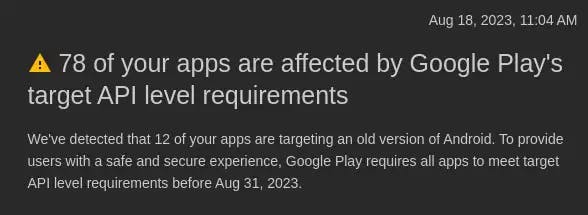Around the world today, mobile apps become the tool that engages the customer with your business. This type of application plays a crucial role in the success of any business, whether it is a well-established industry or just a startup one. But once you decide to inaugurate the mobile presence of your business, then it occurs in your mind what you want to develop for your business. It may be a responsive web app vs a native mobile app, or maybe both. It depends on what type of business and which app each of them benefits for your business needs. Here is the complete guide about mobile app development vs web development that makes your decision easy which one is the best.
Differentiate between responsive web apps vs native mobile apps
It can easily handle both native apps vs web apps on a mobile phone. So we must know the difference between the mobile application and web app.
Process of approval
The native app ensures the safety of the user and the approval process from the app stores. Meanwhile, the app store does not need to approve the Responsive web app because we can access it through any web browser.

Process of approval in Google Play for Native Mobile app
Version
A native app has a different version of the application. Users can use it or ignore it. Moreover, the responsive web app has only one version that every user uses.
How to find a mobile app vs a web app?
We can easily find native apps on the app store from mobile, but responsive web apps are hard to find in the web browser because of the presence of numerous competitors. But it is easy to share with the audience.
Update
Users can update the native apps from the app store, while developers can only update responsive web apps on the web server.
Access process
To access the native app, users must download it on their mobile phones, while the responsive web app can run on the web server of the mobile phone.
Monetization process
Native mobile apps have specific feeds associated with them. For example, Google charges a one-time fee of $25, and Apple charges an annual subscription fee of $100 to host the native apps on the respective app stores. Alongside the hosting fees, these app stores charge anywhere from 30% to 40% of your in-app purchases as fees.

Monetization Process for Native mobile app
Access device features and functions
A native app has access to the functions and features of the device. However, a responsive app does not access the information of the device. On the other hand, web apps can open on multiple types of devices.
Advantages of Native Mobile app
The native mobile app can function offline. These native apps are designed to work in a low connection or function offline. It can download the data from the app and give access to the functions offline. It means if the user doesn’t have an internet connection or a poor connection, he can continue to access the data.
Native app has a secure security process for the users. These apps have access to the device features like finger scanners, which makes the application powerful.
The native mobile app can build the brand behind it. A well-performed and designed application engages with the customer and enhances the user experience by providing opportunities to connect with the customer.
A native app can enhance the user experience. It provides a platform for feedback on a specific user experience and gets user satisfaction and engagement.
A native app has push notification availability. Push notification helps users to engage with the app on time and get reminders and updates.
Native mobile apps have specific feedback platforms. It is easy for users to give feedback regarding maintenance, issues, future trends, and suggestions. That helps the developer to update the app to solve these issues according to user suggestions.
Advantages of Responsive website
The responsive web app is device-friendly. Due to its responsiveness, the responsive web app is device-friendly. It can open on mobile, laptop, tablet, or desktop. There is no effect on the web app due to the switch to another device.
Users can easily share the responsive web app with other users. The web browser can open in the browser only and has a specific URL. Users can easily share this URL link with other new users and recommend it.
The responsive web app is cost-friendly. It helps you to make one website but adapt to different screen sizes and devices which reduces the need for multiple web development.
Responsive web apps have a wider audience. We can share it with the user, which is why the website has a broader reach audience on the web. Mostly, it is available on the web platform that attracts new users.
Users can access instantly responsive web apps through their numerous ranges of devices with the web browser. The user needs to open the web browser on the device and place the URL into the search bar. After loading, it is ready to use without the installation process.
The responsive web app has the best technology process. It contains different screen sizes, CSS, JavaScript, HTML, adaptation content, performance optimization, and daily improvement.
Responsive web apps can be designed and maintained on the web browser. Because these websites are web-based, users do not have to update them. Users need to open it through a web browser and enjoy the content.
Responsive Web apps do not need any specific platform like an app store to download or run on the device. That is why the responsive website is generated to work on a broader range of programs and retrieve through the web browser from multiple devices.
Which one is best: web app vs native mobile app?
According to your needs or goals, you want to build a web app vs a native mobile app. If you need to grow your business in the presence of Swarm, then the responsive web app is the best choice for your business. But if your business is for a specific region or purpose, then the native mobile app is the best one. But in some cases, both native app vs web app is necessary for your business need, and can create both web and native mobile apps.
Frankly, if you want the presence of your business on a website, then a responsive website is the best option. But if you have a specific purpose for your business, then a native mobile application is the best option.
Role of UX/UI in the process of App development
Once you understand the importance of the responsive web app vs mobile apps for your business. It is necessary to know the importance of UX/UI in the app development process. UI/UX plays a vital role in the development process of applications and web apps. UX/ UI is the main element of the development of apps. Due to the UX/UI, the function of the application runs well and attracts users. Here are some significant factors of UX/UI for app development.
Attract the attention of new users
UX/UI can make the design of mobile apps more attractive. That attracts the attention, and users spend more time on the application.
Help to build a brand
There is a brand behind every application. When users use a business application, it builds the trust of users in this brand. It leads to the satisfaction of users and attracts more new users.
Design user flows
UX/UI helps the app to design according to the user flow. It can process the maintenance, accessibility, loading speed, feedback, and offline functionality. So the user does not face any difficulty in accessing the app.
Give security
UX/UI can establish a secure security system in the application that gains trust. It helps to protect user privacy and data, including authentication methods.
Feedback daily
US/UI established the platform for the user to give feedback daily. Users can report issues related to the app and suggestions to improve the app. The developer can update it on the demand of users to remove the bugs and add new features.
Conclusion
In an era of mobile technology, it is not easy to decide between PWA and native apps. You may need native apps, a web app, or both to meet your business needs and goals. Reading all the advantages and differences between responsive apps vs native mobile apps makes it easy for you to choose the best option for your business.
Remember that the responsive web app is cost-friendly and versatile, which leads to a broader range of audiences from numerous devices. However, the Native mobile app provides the best user experience regarding updates and feedback and can access the mobile features. That can help the business to get the best experiences on the mobile. That is why make a wise decision to select one of each, according to your audience’s needs, business goals, budgets, and resources.

Hire Multiverseapp.com for your Mobile App development. Unlocking possibilities, one app at a time.



